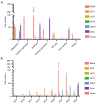Video platforms and sexual healthcare in China: assessment of content on premature ejaculation
- PMID: 40226064
- PMCID: PMC11986497
- DOI: 10.21037/tau-2025-104
Video platforms and sexual healthcare in China: assessment of content on premature ejaculation
Abstract
Background: Premature ejaculation (PE) is among the most commonly reported types of sexual dysfunction both globally and in China. Despite the growing popularity of online healthcare services and the greater availability of information in mainland China, there is a pressing need to assess the quality and reliability of PE-related content available online and address the potential impact of online misinformation. Thus, in this study, we assessed the quality of information regarding PE videos on the top video websites in China.
Methods: The top 10 video platforms in mainland China were searched using PE-related keywords for videos published as of July 2023. All available videos were examined for eligibility and reliability, and two reviewers independently evaluated the videos using Global Quality Score (GQS) scores for quality and DISCERN tools for their content reliability. All data were analyzed with SPSS software (IBM Corp.).
Results: Information on sexual medicine content related to PE was found to be available on just seven of the websites examined. From the 1,468 videos initially retrieved, 582 met the inclusion criteria. Of these, 319 videos (54.81%) were deemed reliable, while 263 (45.19%) were classified as unreliable. The agreement between the two urologists reviewing the videos and the intraclass correlation coefficient (ICC) were deemed acceptable. There were significant differences in the quality, reliability, source, presentation format, and themes of the videos.
Conclusions: The quality of resources on Chinese video platforms varies widely. Users seeking PE-related information should carefully select the appropriate platforms and opt for higher-quality videos. The existing participation of professional medical personnel was seen as insufficient, and joint efforts are needed to implement content review and the establishment of an evaluation framework.
Keywords: Premature ejaculation (PE); online misinformation; sexual medicine; social media.
Copyright © 2025 AME Publishing Company. All rights reserved.
Conflict of interest statement
Conflicts of Interest: All authors have completed the ICMJE uniform disclosure form (available at https://tau.amegroups.com/article/view/10.21037/tau-2025-104/coif). The authors have no conflicts of interest to declare.
Figures
References
LinkOut - more resources
Full Text Sources
Miscellaneous


